Network members busy in Turkey
I have to excuse the long silence here, sorry. Why does this happen wherever I blog? Well, the simple answer is because I'm desperately busy and the complex answer does't belong here so let's move on to the topic, which is, I'm just back from Turkey and what I was doing there is of relevance to this project, so I thought I'd tell you about it.

Dr Luca Zavagno
The background to this is that network member Luca Zavagno, of Bilkent University in Turkey, also has another project of which I'm a member and the University of Leeds is UK partner, a Newton Mobility Award-funded one called 'Not the The Final Frontier': The World of Medieval Islands. The main purpose of this is to refine Luca's own work on the role of Mediterranean islands as a 'third space' or 'middle ground' in the Byzantine Empire, that portion of the Roman Empire which didn't bother falling and just carried on for another thousand years, and ruled Sicily, Crete, Sardinia, Malta and the Balearic Islands (or most of them) well into the ninth to tenth centuries in most cases. That is a fair whack of territory which ought, indeed, to be set alongside Anatolia and the Ægean zone as an extension of imperial concerns, but usually isn't. Luca's going to set that right, but wants to be sure he's tested his ideas with a wide range of scholars first, and I'm part of making that happen. We've had workshops in Leeds and in London and now it was time for the home team to shape up. So I and the other partner in this project, Dr Rebecca Darley of Birkbeck, University of London, were flown out to Ankara and met up with Luca, along with various special guest stars, at Bilkent University.
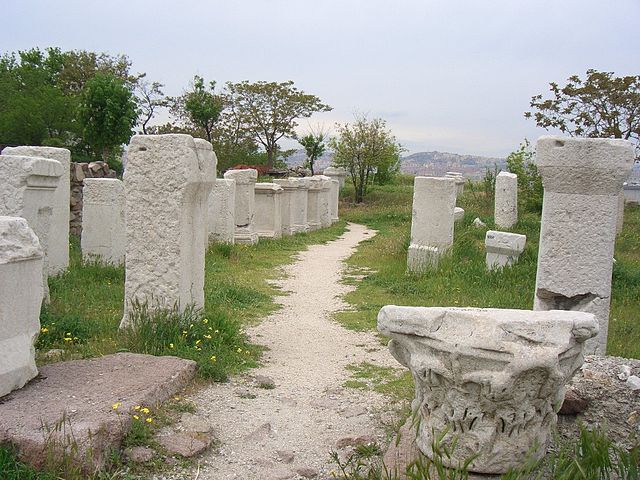
Romand Byzantine tombstones arrayed around the periphery of the Roman baths' site in Ankara, one of the many signs about the place that people have been here for a long time. Photograph by Ahmet Keles at the English language Wikipedia, CC BY-SA 3.0, Link
We were in town for four days all told, with a fairly leisurely program. On the first day Rebecca gave a public lecture about her research on Byzantine coins in India; her basic line is that while trade may have brought them there (and there are a few), they didn't circulate as coinage or as bullion but as special-purpose goods with possibly religious uses. It was Rebecca who organised the conference session in which I first learned that stuff like this also happens in China and it's very interesting, but unless the sea's a frontier (to which we come below...) it's not really our focus on this site. Then the next day I did an introduction to Byzantine coins for Luca's students. Despite the visual aids not being all I might have wished for, and us not having any actual coins to work with alas, the students were really engaged and asked very smart questions; over the stay I became increasingly impressed with the intellectual quality of the Bilkent students, and had to admit I hadn't expected it; implict bias, perhaps, but I was wrong and was happy so to be. Also that day there was another public lecture by Professor Francisco Moreno Martín on Franco's use of the Visigothic past in his Spanish propaganda, which was very interesting even if somewhat as negative evidence; the dictator didn't really have a special place for the Visigoths despite their possible role as Christian uniters of the peninsula, but he was happy to grab at their monuments and symbology whenever opportunity arose. Perhaps we should be happy that Franco wasn't a medievalist... But, dear reader, I think I digress.
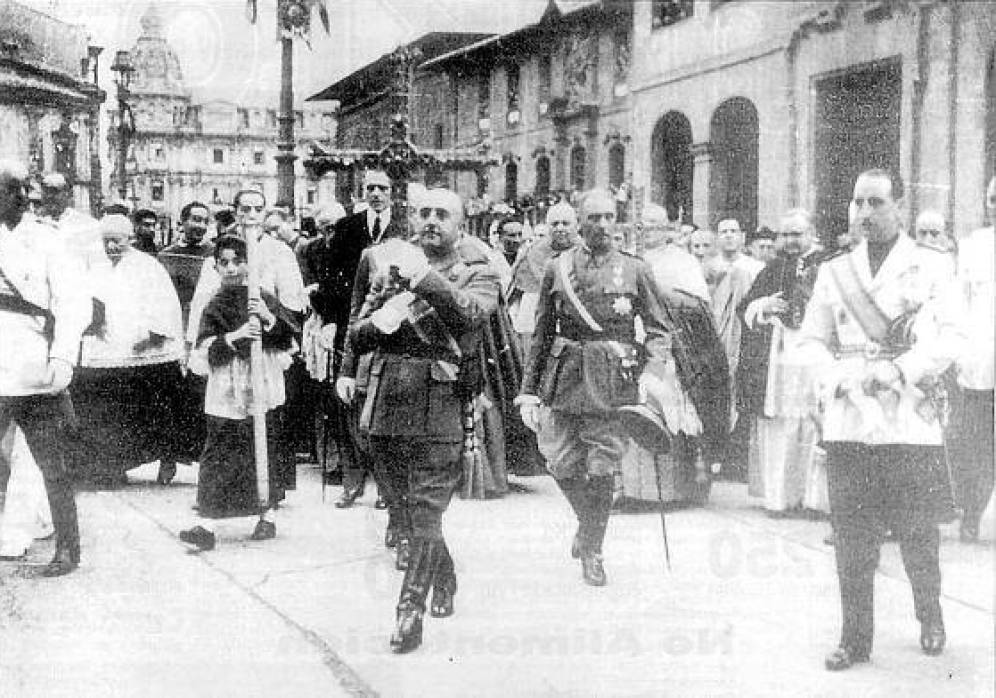
Obviously, my knowledge that I'm digressing cannot stop me using this amazing image, of Generalissimo Francisco Franco carrying the ninth-century Cruz de la Victoria through the streets of Oviedo in 1942, which was made into a postcard and then scanned to be here, or rather at El Confidencial where I found it. What would King Alfonso III have thought? That this was great? Or that it should really have been the king, not his general... ?
Y'see, the reason any of this connects to this site's project is that on the last day of the workshop there was a full-on conference, including both Luca and myself as well as Rebecca, all musing on questions of islands and their interiority or otherwise to larger political configurations. The full program is here, but Rebecca's paper, 'Is an island always a hub? Sokotra, Sri Lanka and the shape of commerce in the Late Antique western Indian Ocean', deliberately pondered places that were outside such configurations. Socotra has never really been anybody's, and though it has been read as a meeting place and junction of worlds, its prolific indigenous species diversity should probably tell us that really it's never been that joined up; Rebecca showed that evidence for it as a contact zone has been over-read and probably shows the opposite, Sri Lanka, on the other hand, has had its own identity which it has been mostly able to defend but did connect to India anyway, and eventually the rest of the world too, just mostly on its own terms.
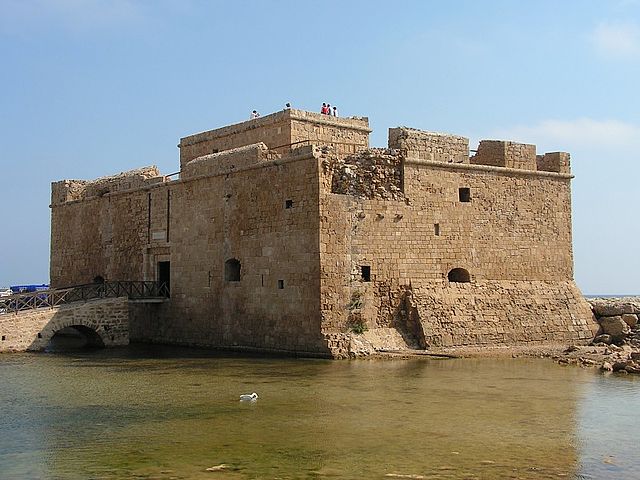
The Cyprus fort of Pafos, once Byzantine, later Crusader, Venetian, and Ottoman, and definitely there to keep people out—but also to let some in? Image licensed under CC BY-SA 2.5, Link
Luca, on the other hand, works on islands that did belong to people and states and did join things up, or at least so they usually did, and his paper, '"I do not know why I go to the extremes": the Balearics and Cyprus between Late Antiquity and the early Middle Ages" explained more about that. But since I have good reason to believe that he will be doing something quite similar at our forthcoming Rethinking the Medieval Frontier conference, for which I will be announcing a program really very shortly, I won't say more here, just that Luca really knows his stuff and the Byzantinists do indeed owe him a rethink. I, however, was being more contrary and, in my paper, 'Nests of Pirates: the Balearic Islands and la-Garde-Freinet compared', looked at two places that have island-like qualities and are both famous as early medieval pirate colonies, a species of connection between places that states nonetheless fought to be rid of. As it turns out, there's really not much evidence for pirates based in the Balearics, as opposed to raiding it (for which there is quite a lot, relatively speaking), but the same sorts of pirates who raided it established several island colonies elsewhere, of which la Garde-Freinet was one. Except that it's not an island, it's a roughly 20 km2 stretch of coastal Provence. But that didn't stop Islamic geographers depicting it as an island, even though they knew better; that was obviously the conceptual role it performed for them, probably, I argued, because it was cut off and hard to reach like an island, not because of its openness and connectability.
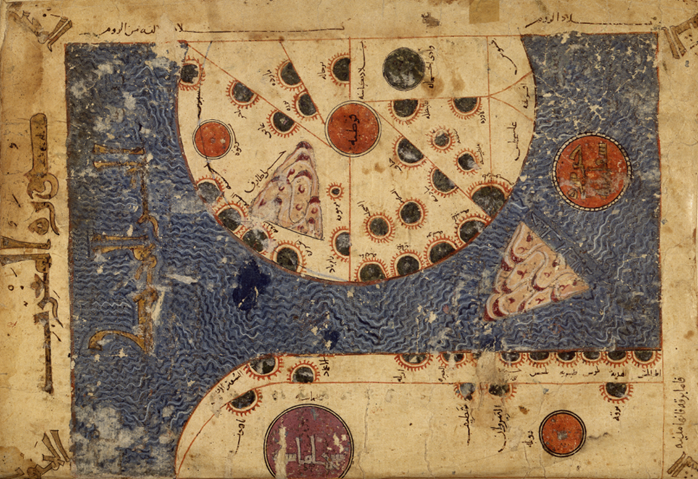
Depiction of the Western Mediterranean from a map in an 1138 manuscript of Abū Ishāq ‘al-Iṣṭaẖrī's Kitāb al-Masālik wa-l Mamālik (c. 977): la-Garde-Freinet, Jabal al-Qilāl in Arabic, is the menacing-looking triangle pointing at the Straits of Gibraltar. Leiden, Bibliotheek der Rijkuniversiteit, MS Or. 3101, p. 20
Now, Luca and I are friends and gentlemen, so we didn't fight about this on the spot; instead, we are taking the scholarly solution of co-editing a journal issue in which we can argue with each other in print. But it does raise questions about whether these island or island-like spaces are in fact frontiers, and if so of what kind. When only the sea is on one side of the border, what do you in fact have a frontier with? Surely anyone who turns up. But la-Garde-Freinet probably had ghazī warriors in it raiding quite a long-range neighbourhood; in Islamic terms it was definitely a thaghr, a frontier space in the sense of being the route between the domain of Islam (back home in Muslim Spain?) and the domain of war, beyond its own borders, but that put it conceptually inside a territory that, practically, could only reach it by a very attenuated connection by sea through hostile waters (the Byzantines still ran Sardinia at this point, and destroyed the Muslim port in 942). Can a whole land mass be a frontier? With what? And so on. Sri Lanka probably had a frontier with India, but it would have been in the sea; Socotra didn't really have a self to be an entity with, but neither was it within anyone else's space. (I should stress that this is just me riffing on a keyboard; Rebecca's views might well be different and would certainly be better worked-out.)
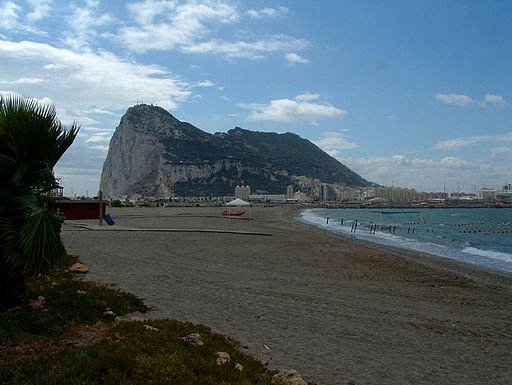
Whose frontier exactly, and onto what? The Rock of Gibraltar viewed from La Linea, its meeting point with Spain, with the open sea visible beyond. Image from Wikimedia Commons.
So, there are lots of ways in which islands do and don't fit a normal frontier schema; not every frontier is an island, obviously, but likewise only some islands may be frontiers. But who can decide that? As usual, once we get started we never run out of questions, but some of these questions are important to ask, and most of them are, as the saying goes, good to think with. I'll let you know when you can read us thinking with them, but meanwhile, you could come to the conference and hear it for yourself! I will have details up very very shortly...
I don't have time to provide the sheaf of references I might ordinarily equip a post here with, but I can mention two obvious starting points, one being Ö. Çaykent and Luca Zavagno (eds), The Islands of the Eastern Mediterranean: a History of Cross-cultural Encounters (London: I. B. Tauris, 2014), and the other (for the crazy island-not-an-island) Mohammad Ballan, 'Fraxinetum: An Islamic Frontier State in Tenth-Century Provence', Comitatus, 41 (2010), 23–76, DOI: 10.1353/cjm.2010.0053.
